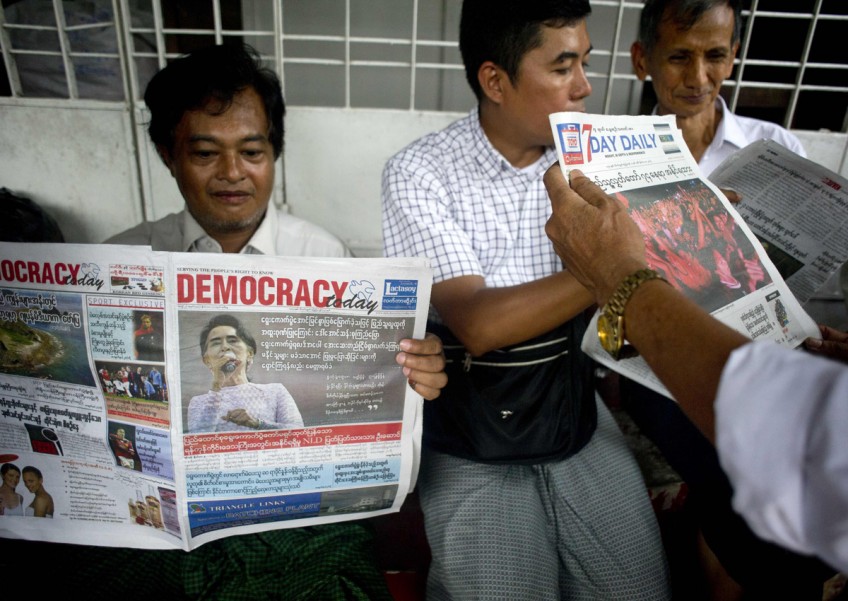Myanmar's long road to national reconciliation


Ms Aung San Suu Kyi, chairman of the National League for Democracy (NLD), on Nov 11 called for "national reconciliation" and requested a meeting with President Thein Sein, military commander-in-chief Min Aung Hlaing, and Speaker Shwe Mann of the Lower House of Parliament.
In separate letters addressed to the three leaders, Ms Suu Kyi wrote: "A peaceful implementation of the people's desire, which they expressed via the Nov 8 elections, is very important for the country's dignity and people's peace of mind."
It is still unclear whether the NLD leader will hold separate meetings with each leader or meet jointly, which is expected to happen in the next few days once the Union Election Commission officially declares the final result.
While accepting the invitation, President Thein Sein and Senior General Min Aung Hlaing congratulated the NLD on its electoral victory and reiterated their pre-election assurance of peaceful power transfer to the new government.
When they meet, the leaders will focus on national reconciliation. What does this national reconciliation mean and how significant is the issue at this juncture of Myanmar's political transition?
There are some possible interpretations of what national reconciliation may mean for the NLD, the President and the military.
The NLD wants to ensure that history does not repeat itself: After the 1990 general election, the military government refused to transfer power. In other words, the NLD wants assurances from the President and the military chief for a peaceful transition.
Not only does the NLD want the military to respect the election result, but the party would also want to gradually reduce the role of the military in politics.
As much as it is essential to reach out to the military, the President and the Speaker, the NLD should also reach out to other political parties and urge their co-operation for peace and development.
Regardless of the size of its representation in Parliament, the NLD should reach out to ethnic-based political parties as well as the armed groups. Ms Suu Kyi needs to find a peaceful solution to the ongoing armed conflicts in ethnic areas. She also needs to find a way to peacefully address sectarian/religious tension across the country.
For the current and former military leaders, who include both Senior General Min Aung Hlaing and President Thein Sein, national reconciliation would mean a gradual and systematic political transition in accordance with the 2008 Constitution.
The two leaders would not want to discuss or compromise on issues such as elimination of the quota of 25 per cent of seats reserved for the military in all legislatures, and the dominant role of the military in the powerful National Defence and Security Council.
The military may also be unwilling to compromise on the appointment of Cabinet ministers for the defence, home and border affairs portfolios, which are constitutionally reserved for the military.
Moreover, for the military, any talk of national reconciliation would have to adhere to three principles: Non-disintegration of their union, non-disintegration of national solidarity, and perpetuation of national sovereignty.
As long as the ethnic minorities' demand for federalism is not addressed, the military, as an institution, will continue to have concerns about the possible disintegration of the union. Historically, the military considers itself as guardian and protector of the state.
The military's leaders also have lingering concerns over possible prosecution and indictment of crimes they committed during decades of military rule.
Despite the implementation of some reforms in the past five years, people across the country still see the Union Solidarity and Development Party as a military proxy, similar to the National Unity Party during the 1990 general election.
The NLD electoral victory is largely a show of support for the party and its leadership. The personality of candidates did not play a significant role.
The fact that Ms Suu Kyi is constitutionally barred from the presidency has won her sympathy from the voters. In some way, the NLD is also being rewarded for the way it was treated after the 1990 election.
Though Ms Suu Kyi has recently come under criticisms for not speaking out on human rights issues, a majority of people in the country, including ethnic minorities, still see her to be a more trustworthy leader than many others and one who can lead the country to peace and prosperity.
Despite the changes in the political landscape after the election, the Myanmar people as well as the international community must understand that a true sense of national reconciliation will not happen until the demands of ethnic minorities are politically resolved, the military comes under the control of a democratically elected civilian government, and the 2008 Constitution is no longer the basis of democratisation.
stopinion@sph.com.sg
The writer is a US-based political scientist and author of three books on Myanmar, including the forthcoming Democratisation Of Myanmar.

This article was first published on November 16, 2015.
Get a copy of The Straits Times or go to straitstimes.com for more stories.